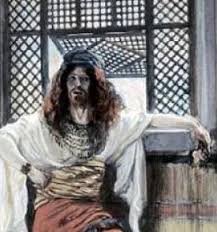Absalom Flees
Second Samuel 13: 34-39
Absalom flees DIG: Where did Absalom flee? What might he get from his grandfather that he dare not ask his father for? With Amnon dead, what might Absalom think as a refugee and heir apparent to the throne of Isra’el? What was his plan? “Skill without scruple, wisdom without ethics, and insight without integrity.” This summary of the character of Jonadab brings to mind the thought that skill, wisdom and insight may be the qualities that we look for in the leaders of the congregations of God. But do we remember the other three qualities also?
REFLECT: From what hurts do you feel like “running away?” Where would you go? How long have you waited to reconcile with one of your children? Your parents? Do you protect your children or spoil them? How did David parent? How did David react when Tamar was raped? How did he react when Absalom fled? In your life is “tough love” appropriate in some circumstance? What can you learn from David’s mistakes?
980 BC

Meanwhile, Absalom fled in the opposite direction, probably during the confusion that ensued when the king’s sons ran for their lives fearing assassination themselves. Only Absalom and his guilty servants knew what was going to happen at the feast, so everyone else was caught off guard. They were all witnesses and could easily testify that Absalom was guilty. Absalom knew he was in jeopardy. So Absalom did not wait. He fled.
Now the man standing watch looked up and saw many people on the road west of him, coming down the side of the hill. The watchman went and told the king, “I see men in the direction of Horonaim, on the side of the hill.” Jonadab recognized the princes and pointed out that he had been right, saying to the king, “See, the king’s sons have come. It has happened just as your servant said.” The watchman just reported seeing many people, but Jonadab knew just who they were because he was part of the plot. Just as he finished speaking, the king’s sons came in, wailing loudly. The king, too, and all his attendants wept very bitterly (Second Samuel 13:34-36). Although all the sons were not killed, Amnon was killed, and that was reason to weep.
Absalom fled eighty miles northeast to the home of his maternal grandparents in Geshur, where his grandfather, Talmai, was king (Second Samuel 3:3b). No doubt this safe haven had been arranged beforehand, and it’s likely that Talmai would have loved seeing his grandson crowned king of Isra’el.364 Absalom had escaped, Amnon being brought to justice, but at the same time it seemed that Absalom had forfeited any likelihood of inheriting the throne of Isra’el. Meanwhile, back in Jerusalem, King David mourned day after day for his firstborn son, Amnon (Second Samuel 13:37).
After Absalom fled and went to Geshur, a buffer state between Isra’el and Syria, he stayed there three years. Three years is a long time, and King David was finished with wanting (Hebrew: kalah means to come to an end, to be finished, or against) to go to Absalom. David was consoled concerning Amnon’s death. David had to come to terms with the loss of Amnon because he was dead. Absalom, however, might as well have been dead so far as his father was concerned. They were both deadlocked. David was reluctant to take up arms and capture his son, and Absalom (Hebrew: my father is peace) was unwilling to throw himself on the mercy of the king. David’s love and his sense of justice found no place for reconciliation, so, torn between the two, he did nothing (Second Samuel 13:38-39). It is ironic that David, who was innocent in his younger days by taking no action against Sha’ul, became guilty in his later years for failing to execute justice within his own family. One reason had to do with his own failing, which he saw being reproduced in his sons; yet another reason arose out of his love for his sons, who nevertheless did not hesitate in deceiving him into doing whatever they wanted and involving him in their wicked plans.365
We have come all the way through Chapter 13 where disaster followed disaster, and life in David’s family rushed along, driven by lust, conniving, weakness, and hatred. A shattered woman remained ignored by justice and unrestored by murder. And YHVH is never mentioned in the whole affair. Not once! What was He doing all that time? Was the monarchy He established reeling out of control, its course subject only the whims and sins of mankind?
That’s sometimes our impression of God’s Kingdom or His sovereign rule in human history. It all seems like a microcosm of Second Samuel 13, with everything bashing and bouncing around with Ha’Shem seemingly indifferent. But, of course, that wasn’t true for David and isn’t true for us. We have already been given a clue for this chapter in 12:10-12. YHVH had told David that the sword would not depart from your house and that He was rising up disaster against you from your own house. Is this not what has begun to happen in Chapter 13? Many have pointed out the appropriateness of the disaster: Amnon’s sexual escapade with Tamar corresponding to David’s with Bathsheba, and Absalom’s arranged murder paralleling David’s murder of Uriah. In this sleazy episode, then, Ha’Shem was fulfilling His word or judgment against the house of David. Humanly speaking everything seems to be coming unhinged; yet ADONAI is fulfilling His word spoken through Nathan His prophet. The LORD is in total control. God has not hung out a vacancy sign over His universe or His people. He is there, fulfilling His word. Sometimes only that assurance keeps us sane.366



Leave A Comment